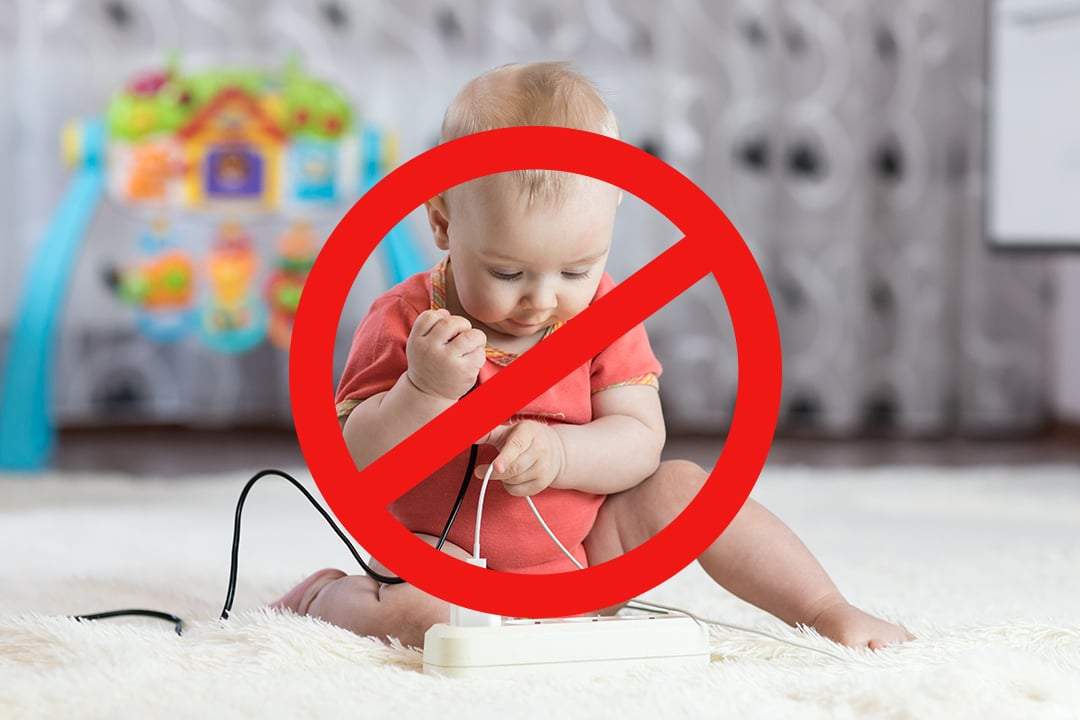
How can we keep ourselves, our kids, our pets and other loved ones safe around electricity?
Let’s start with the biggies: Never touch power lines, climb on power poles, play on transformers, or tamper with electrical equipment in any way.
If you see potential trouble, like tree branches growing into wires, or an open transformer, keep your distance and let us know right away by calling 877-588-1010. If you see a downed power line, stay as far away as possible and call 911 first. Also avoid downed or damaged solar panels, wiring and components. Assume they are energized like a power line. Stay as far away as possible and call 911.
Now, what about other day-to-day scenarios that could harm kids, pets and everyone else in your household?
There’s a lot to think about. Here we go:
Kids & Pets
- Keep electrical cords away from puppies and kittens so they don’t chew on them and get shocked. What may seem like a mild shock to an adult may be enough to kill a small pet. Cover the cord with a heavy plastic sleeve or ask your pet store for a bitter tasting product to put on the cord.
- Don’t leave charging cords plugged in (especially hanging down and accessible) when not in use. Toddlers, children or pets could put these in their mouths and get burned or shocked.
- If you think your pet chewed on a cord or made contact with another electrical source, look for evidence of burns, increased drooling, coughing, breathing difficulties, mouth irritation, or signs of pain or distress. If you detect any of these, seek veterinary care immediately.
- Check to be sure night lights and appliances are completely plugged into wall outlets. Small fingers, paws or tongues can easily find partially exposed prongs and are a hazard for curious children, puppies and kittens.
- All appliances near sinks or bathtubs should be plugged into an outlet equipped with a Ground Fault Circuit Interrupter (GFCI). Never keep small appliances or electrical devices, such as curling irons, blow dryers or plugged-in cell phones, near water. Kids or pets can knock them into the water, creating a dangerous and possibly deadly situation. GFCIs stop the flow of electricity if there is a problem, and when properly used, can save lives. Check GFCIs monthly to make sure they are working.
- Don’t allow pets to curl up for a nap behind warm computer equipment, a clothes dryer or other electrical items.
- Remind your kids to unplug the toaster or toaster oven before using a knife or fork to remove stuck bread or bagels.
Safety for All
- Check the wattage of all light bulbs to make sure they’re the correct wattage for the size of the fixture.
- Make sure extension cords are in good condition - not frayed or cracked. Make sure they’re placed out of traffic areas. Don't run electrical cords underneath rugs, carpets or furniture and never nail or staple them to walls or baseboards.
- Check to see that extension cords are not overheated. Only use extension cords on a temporary basis; they are not safe as permanent household wiring.
- Circuit breakers and fuses should be the correct sizes for the circuits. If one appliance repeatedly blows a fuse or trips a circuit breaker, or if it has emitted an electric shock, unplug it and have it repaired or replaced.
Even Outdoors
Working outside? Don’t let your guard down! And remember to call 811 at least two business days before you dig to avoid cutting utility lines.
- Use only weather-resistant, heavy gauge extension cords marked "For Outdoor Use," and make sure it is the proper rating for your equipment.
- Never remove safety guards from lawnmowers, power tools, etc.
- Use safety goggles when operating lawn equipment and wear appropriate safety gear as suggested in power tool manuals.
- Keep cords out of your path or work area.
- Use caution when operating electrical equipment around water. If an electrical tool comes in contact with water, unplug it first. Do not reach into the water for it.
- Ground fault circuit interrupters (GFCIs) can prevent many electrocutions. They should be used in any area where water and electricity may come into contact – near pools, spas or fountains. Test GFCIs regularly according to the manufacturer's instructions to make sure they are working properly.
- Unless you are a qualified electrician, never try to repair electrical products yourself.
For more safety tips, visit Home Safety (tampaelectric.com)
